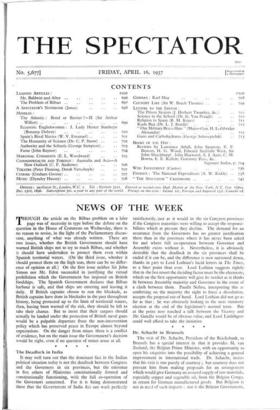The Deadlock in India It may well turn out that
the dominant fact in the Indian political situation today is not the deadlock between Congress and the Governors in six provinces, but the existence in five others of Ministries constitutionally formed and constitutionally functioning, with the full co-operation of the Governors concerned. For it is being demonstrated there that the Government of India Act can work perfectly satisfactorily, just as it would in the six Congress provinces if the Congress majorities were willing to accept the responsi- bilities which at present they decline. The demand for an assurance from the Governors has no greater justification there than in the provinces where it has never been asked for and where full co-operation between Governor and Assembly exists without it. Nevertheless, it is obviously desirable that the deadlock in the six provinces shall be ended if it can be, and the difference is now narrowed down, thanks in part to Lord Lothian's lucid letters in The Times, to a finer point than ever. Lord Lothian suggests rightly that in the last resort the deciding factor must be the electorate, which on the first opportunity will give its verdict as it thinks fit between Assembly majority and Governor in the event of a clash between them. Pandit Nehru, interpreting this as conferring on the majority the right to force a dissolution, accepts the proposal out of hand. Lord Lothian did not go as far as that ; he was obviously looking to the next statutory election at the end of the legislature's normal term. But at the point now reached a talk between the Viceroy and Mr. Gandhi would be of obvious value, and Lord Linlithgow could well afford to take the initiative.
* * * *






















































